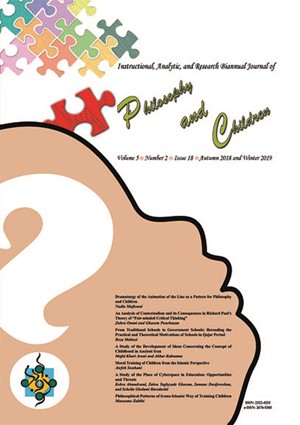A Study of the Development of Ideas Concerning the Concept of Childhood in Ancient Iran
Subject Areas : Views and methods of philosophy of children in the world (past and present)Majid Khari Arani 1 * , Akbar Rahnama 2
1 -
2 -
Keywords: ancient Iran child education objectives of training ,
Abstract :
The present article proceeds to study the concept of childhood in ancient Iran with reference to certain documents including books and other sources. Research findings indicate that the organization of education in the last centuries was not the same in different places and times. In those days, families, fire temples, and teaching centers affiliated to the courts had undertaken the training of children and youth. Later on, primary schools and universities also came up and joined the same mission. Historically speaking, Iranians had special respect to knowledge, to the extent that, in their religious supplications, God was asked to grant knowledge to them. In the teachings of Zoroaster, one of the ways of attaining heaven is to make effort in educating people. For it is believed that through knowledge, evil and cruelty, as the signs of ignorance, will go away. In ancient Iran learning initiated from childhood and continued till old age ceaselessly. Education is meant for life, that is, knowledge and action go ahead hand in hand, and engulf the whole life and activity of man. In this system of education, man not only sought to attain certain moral virtues and intellectual principles, but also tried to learn some civil sciences and to implement in his practical life. The chief goal of education in ancient Iran was to bring children up to being theist and religious, possessing good moral, learning certain arts, and medical know-how. Concluding that as ancient remains show, the primary factors of education in ancient Iran were as follows: nature and geographical condition, the tenant of the Aryans as modified by Zoroaster, the role of religion in bringing children up and process of education.
آروزمانی، فریدون (1393) هنر ساسانی، تهران: پازینه.
اجاق، محمد؛ واعظ شهرستانی، زينب (1392) «تعلیم و تربیت در ایران باستان»، فصلنامه تحقیقات روانشناختی، شماره 5، ص52-65.
بویس، مری (1375) تاریخ کیش زرتشت، ترجمه همایون صنعتیزاده، تهران: انتشارات توس.
بیژنی، اسدالله (1350) سیر تمدن و تربیت در ایران باستان، تهران: انتشارات ابنسینا.
پيگولوسكايا، ن. و. (1345) شهرهاي ايران در روزگار پارتيان و ساسانيان، ترجمه عنايتالله رضا، تهران: انتشارات علمي و فرهنگي.
تکمیل، همایون ناصر (1382) نظامها و نهادهای آموزشی در ایران باستان، تهران: پژوهشگاه علوم انسانی و مطالعات فرهنگی.
حکمت، علیرضا (1350) آموزش و پرورش در ایران باستان، تهران: انتشارات مؤسسه تحقیقات و برنامهریزی آموزشی.
دوستخواه، جلیل (1355) اوستا نامه مینوی آئین زرتشت، تهران: انتشارات مروارید.
زرینکوب، عبدالحسین (1364) تاریخ مردم ایران کشمکش و قدرتها، تهران: انتشارات امیرکبیر.
سجادیه، نرگس؛ آزادمنش، سعید (1395) «زیرساخت مفهومی دوران کودکی در تطور تاریخ: بسوی مفهوم پردازی اسلامی از کودکی»، مجله فلسفه تربیت، سال 1، شماره 1، ص 140- 115.
سلطانزاده، حسین (1364) تاریخ مدارس ایران از عهد باستان تا تأسیس دارالفنون، تهران: انتشارات آگاه.
فردوسی (1381) شاهنامه، تهران: انتشارات ققنوس.
کالج، مالکوم (1375) پارتیان، ترجمه مسعود رجبنیا، تهران: انتشارات سحر.
گیدنز، آنتونی (1378) جامعهشناسی، ترجمه منوچهرصبوری، تهران: نشر نی.
مجدفر، فاطمه (1382) جامعهشناسی عمومی، تهران: انتشارات شعاع.
میری، نگین؛ جلالی، مریم (1395) «جلوههای کودک و کودکی در متون پهلوی و هنر ایران ساسانی»، مجله تاریخ ایران، دوره 9، شماره 2، ص174- 147.
هرودوت (1358) تواریخ، ترجمه وحید مازندرانی، تهران: انتشارات وحید.

